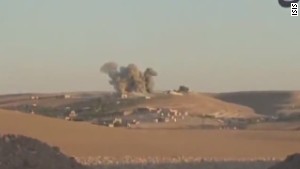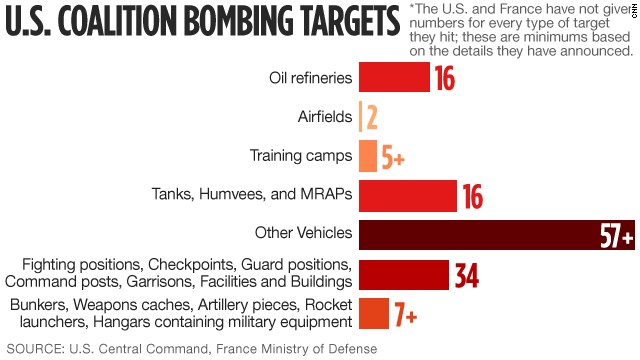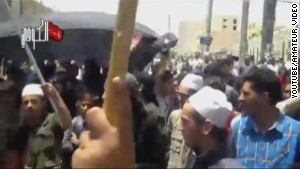ISIS closes in on Kurdish town in Syria; Turkey debates sending troops
September 30, 2014 -- Updated 2322 GMT (0722 HKT)
Source: CNN
The flood of refugees
from Syria has escalated -- with 150,000 people fleeing to Turkey in
recent days -- as ISIS fighters armed with tanks and heavy weapons
advance on the predominantly Kurdish town of Kobani, known in Arabic as
Ayn al Arab, destroying villages in their path.
ISIS fighters were just
three kilometers (nearly two miles) east of the northern Syria town late
Monday, a civilian in Kobani told CNN on condition of anonymity. CNN
cannot independently confirm the claim, though it matches reports
released by the Syrian Observatory for Human Rights, a monitoring group.
U.S. airstrikes overnight targeted ISIS positions near Kobani, said Rear Adm. John Kirby, spokesman for the Pentagon.
It was unclear whether
the strikes stopped the ISIS advance, and Kirby provided only cursory
details about what they targeted and what damage may have resulted.
When asked why airstrikes
in the Kobani area appear to be limited, a senior U.S. official,
speaking on condition of anonymity, said a lack of direct, reliable
intelligence on the ground and the need to be precise to avoid civilian
casualties were among the factors.
Turkey considers going after ISIS
If ISIS takes Kobani, it
would control a complete swath of land from its self-declared capital of
Raqqa to the Turkish border, more than 100 kilometers (60 miles) away.
It has been fighting for months, capturing portions of northern and
eastern Syria and western and northern Iraq for what it says is its new
Islamic state -- or caliphate.
The Turkish Parliament
on Tuesday took up the issue whether to send troops into Iraq and Syria
to fight ISIS. The debate was expected to continue into the latter part
of the week before lawmakers voted, according to Anadolu, Turkey's
semi-official news agency.
Turkey has said it is
offering support to a U.S.-led coalition targeting ISIS, but has stopped
short of joining the 40-some countries who make up the coalition.
But with more than
150,000 refugees pouring into the country since last week, adding to the
hundreds of thousands who have already fled the Syrian civil war, and
concerns about ISIS controlling border points, Turkish lawmakers are
taking up the issue.
Obama assesses ISIS strategy
At the same time, U.S.
President Barack Obama met with his National Security Council to discuss
what White House officials described as a comprehensive strategy to
counter the threat posed by ISIS, also known as ISIL.
The meeting follows
Obama's admission on CBS' "60 Minutes" that the United States
underestimated the strength of ISIS and overestimated the ability of the
Iraqi security forces to fight the group.
Nowhere was that
assessment more evident than in reports ISIS had seized another Iraqi
military base about 80 kilometers (50 miles) west of Baghdad over the
weekend.
Dozens of ISIS fighters
attacked the Albu Aytha military base, north of Ramadi, where 180 Iraqi
soldiers were stationed, according to Faleh al-Essawi, deputy head of
the Anbar provincial council.
ISIS has been fanning
out across the Sunni-dominated Anbar region in recent months, targeting
bases one by one across the vast area.
About a week ago,
details emerged regarding the massacre of more than 100 Iraqi soldiers
at bases in Saqlawiyah and Sejar, also near Ramadi.
A handful of survivors
accused the Iraqi government of failing to respond to pleas for help
ahead of the final ISIS assault on the base, after a dayslong siege.
ISIS overruns military base
While the majority of
soldiers withdrew from the Albu Aytha base prior to it being overrun
Sunday by ISIS fighters, a number of soldiers appear to have been
killed.
Images posted online by
ISIS purport to show the takeover of the base in question, and include
images of men dressed in uniform who appear to be dead Iraqi soldiers.
While CNN cannot
independently verify the authenticity of the ISIS images, giveaway
features on the base and in the landscape do appear to show western
Iraq, specifically, and very likely the base in question.
ISIS also seized a large weapons cache left behind at the base, al-Essawi said.
Amid the continuing violence, a string of car bombs and mortar attacks hit Iraqi cities, leaving dozens dead.
In Baghdad, two car
bombs and seven mortar attacks struck primarily Shiite neighborhoods,
killing at least nine people and wounding 40, police officials said. Car
bombs also exploded in the predominantly Shiite cities of Hilla,
Karbala and Basra, Iraqiya state TV reported. All three are south of the
Iraqi capital.
UK carries out first airstrikes
The attacks came the
same day that the United Kingdom said it conducted its first airstrikes
against ISIS in Iraq, striking targets four days after Parliament voted
to approve the country's involvement.
British planes helped
Kurdish troops who were fighting ISIS in northwestern Iraq, dropping a
bomb on an ISIS heavy weapon position and shooting a missile at an armed
pickup truck, the UK's defense ministry said.
An initial assessment indicates both strikes were successful, according to the ministry.
British planes had been
involved in reconnaissance missions over Iraq in the days since
lawmakers approved UK airstrikes against ISIS in Iraq on Friday, but
Tuesday's strikes were a first.
 ISIS closes in on key Syrian border city
ISIS closes in on key Syrian border city
 ISIS targets hit by coalition
ISIS targets hit by coalition Support for ISIS growing in Jordan
Support for ISIS growing in Jordan
 New ISIS video mocks airstrikes
New ISIS video mocks airstrikes
Britain joins the United
States and France as countries that have hit ISIS in Iraq with
airstrikes, while Belgium and Denmark have also said they also will
provide planes. Of those nations, only the United States -- in
partnership with some Arab countries -- have struck ISIS positions in
neighboring Syria.
Peshmerga 'need more support'
In northern Iraq,
Kurdish fighters known as Pershmerga, went after ISIS fighters in Rabia,
a major border crossing between Syrian and Iraq that has been under the
control of the militants since late June, Brig. Gen. Hazhar Ismail at
the Peshmerga Ministry in Irbil told CNN.
ISIS has been collecting
money from people who use the border crossing, he said. The operation
was preceded by coalition airstrikes.
In Iraq, airstrikes
overnight destroyed more ISIS transport and armored vehicles. There were
also strikes near Mosul Dam, one of the country's largest hydroelectric
dams, the U.S. military also said. The dam provides water to most of
northern Iraq.
There were also strikes northwest of Baghdad and one that hit west Fallujah, according to the military.
On the ground, Hazhar said, the Kurdish forces needed closer air support in the form of helicopter cover during operations.
He complained that the
Peshmerga's budget, weapons and training must go through the central
government in Baghdad and claimed that the Peshmerga "have not received
one dollar from Iraq, even though Parliament has approved funds."
.
CNN's Ben Wedeman reported from Irbil and
Gul Tuysuz from near the Turkey/Syria border, while Chelsea J. Carter
reported and wrote from Atlanta. CNN's Hamdi Alkhshali, Laura
Smith-Spark, Mohammed Tawfeeqm, Barbara Starr and Jason Hanna
contributed to this report.

No comments:
Post a Comment